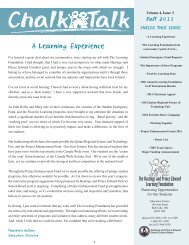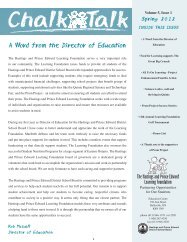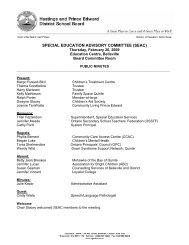Grade 11 Healthy Active Living Education Additional Supports ...
Grade 11 Healthy Active Living Education Additional Supports ...
Grade 11 Healthy Active Living Education Additional Supports ...
Create successful ePaper yourself
Turn your PDF publications into a flip-book with our unique Google optimized e-Paper software.
Specific Symptoms:<br />
Most people with obsessive-compulsive disorders fall into five categories:<br />
• Washers Ð fear of contamination and usually have cleaning compulsion<br />
• Checkers Ð repeatedly check things like oven, irons, locks, etc.<br />
• Doubters and sinners Ð fear terrible things will happen if all is not perfect<br />
• Counters and Arrangers Ð ruled by magical thinking and superstitions<br />
• Hoarders Ð cannot throw things away, if they do, they fear that terrible things will<br />
happen<br />
Mental Health Disorder Research Information Ð Schizophrenia<br />
Name of Disorder: Schizophrenia<br />
General Description:<br />
Schizophrenia is a disturbance involving delusions, hallucinations, disorganized speech<br />
and/or disorganized or catatonic behaviour. Delusions are false beliefs or<br />
misinterpretations of situations and experiences. Hallucinations can be auditory, visual,<br />
olfactory (smell), gustatory (taste) or tactile (touch), but auditory hallucinations are most<br />
common. Schizophrenia is also associated with a deterioration of a personÕs ability to<br />
function at work, school and/or socially. It may begin in late adolescence or early<br />
adulthood.<br />
Signs/Symptoms:<br />
Physical:<br />
• Delusions (beliefs not founded in facts)<br />
• Hallucinations (when a person hears,<br />
sees, feels, smells, or tastes something<br />
that does not exist)<br />
• Thought Disorders (disorganized or<br />
catatonic behaviours)<br />
• Behavioural Monitoring (grossly<br />
disorganized or catatonic behaviours)<br />
• Disturbance of speech (odd speech)<br />
• Loss of ability to relax, concentrate, or<br />
sleep in the early stages<br />
• Marked impairment in personal<br />
hygiene and grooming<br />
Emotional:<br />
• Affect or mood of an individual may<br />
appear to be very flat (unemotional) or<br />
inappropriate<br />
• Altered sense of self (a personÕs sense<br />
of self or personal identity may be<br />
greatly diminished)<br />
• Relationship to external world (the<br />
person may appear to be withdrawn and<br />
preoccupied having no contact with the<br />
environment or outside world. Might be<br />
described as cold or aloof.)<br />
• Volition (a person may have no interest<br />
in the world or their place in it. The<br />
person may become indifferent towards<br />
plans for the future.)<br />
• Difficulty relating to others (social<br />
isolation or withdrawal)<br />
Possible Impacts(s) on Life:<br />
• Affects all aspects of a personÕs daily life<br />
• <strong>Education</strong>al progress is often disrupted, and young people may be unable to finish<br />
school or hold a job for a sustained period of time<br />
• Requires much family, community support<br />
• Usually requires rehabilitation and medication during acute periods of the illness<br />
• Society often ostracizes people with this illness, due to lack of understanding and a<br />
fear of the risk of suicide.<br />
<strong>Grade</strong> <strong>11</strong> <strong>Healthy</strong> <strong>Active</strong> <strong>Living</strong> <strong>Education</strong> (PPL30), Module #2 Positive Mental Health and Stress<br />
Page 71
















